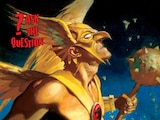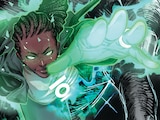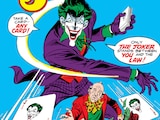One of the cool things I’ve found about HBO Max is that it gives you a chance to revisit some of your favorite DC films and look at them from a new angle. Take Todd Phillip’s Joker, for example. Even if you saw the movie in theaters, there are new things you can find and unpack from rewatching it, especially if you haven’t seen it since its initial release.
While Joker was a runaway hit and garnered Academy Awards for both its star, Joaquin Phoenix, and its composer, Hildur Guðnadóttir, the film is still provoking spirited debate among DC fans over a year after its release. Was Arthur Fleck a victim of society, or a deranged individual who couldn’t take responsibility for his own misfortune? In a way, Joker could almost be a Rorschach test of sorts since it’s clear that different audience members have their own interpretations of the message. Let’s take a look at both arguments.

Did society fail Arthur? His mother manipulated and abused him. Arthur knew he was mentally unwell, and his first instinct was to go through the proper channels and get help. Unfortunately, his social worker wasn’t sympathetic to his plight and left Arthur out in the cold when lack of funding forced her to end their sessions. Arthur tried to make himself a productive member of society by getting a job, but his co-workers belittled and betrayed him, while his employer treated him like garbage.
In his heart, Arthur wanted to be good. The confrontation with the businessmen on the subway only happened because Arthur wanted them to leave a poor woman alone. When Arthur visited Wayne Manor, he was playful with Bruce Wayne and didn’t want to harm the child, and things didn’t get aggressive until Alfred shooed him away. Arthur commits despicable acts throughout the movie, and there is no justifying that, but it’s worth noting that all of his targets seemed to be people who he felt wronged him in some way.
I want to make one thing clear before we go any further—it doesn’t matter how many people failed Arthur, murder is never an acceptable form of retaliation. Although Arthur tells late night host Murray Franklin that he’ll get what he deserves, that doesn’t mean that anybody “deserved” to be killed. Although Arthur was a victim, he was still misguided, and his reactions were illegal and immoral. But nobody ever said the protagonist was going to be a heroic individual. Afterall, this movie is called Joker, not Batman.

This brings up the other side of the argument: was Arthur always doomed to become the Joker? Even if his social worker had shown him more empathy and his place of employment had been kinder, would Arthur have still embraced his murderous tendencies? Perhaps society sped up Arthur’s dark turn rather than creating it? Arthur could have gotten proper therapy, found success as a comedian and been treated with dignity by Murray Franklin, and it’s still possible that he might have become the Joker. Perhaps it was who he was at his core. Remember, he said he liked killing. Were his solemn moments introspection or remorse? Who could say?
In a way, this debate makes the film into a live-action variation on Batman: The Killing Joke, the popular Alan Moore and Brian Bolland graphic novel that told its own version of the Joker’s origin story. The Joker’s mantra in The Killing Joke was that all it takes is one bad day to drive a person insane, a message that Batman rejects. Was Arthur the victim of “one bad day” or was Batman right? Did Arthur have the potential for evil in him all along?
Speaking of The Killing Joke, like the famous graphic novel, this film also has an ambiguous ending. Why does Arthur have bloody footprints when he’s in the hospital at the end? How much of what we’re seeing really happened? Remember, Arthur imagined a fake relationship with his neighbor Sophie, so it’s possible that some of the ending is in his head as well.

Some of these questions get into the nature vs. nurture debate, which we may never have a definitive answer for. Was Arthur always destined to go down his villainous path, or did he have the potential for a happy life before he became a victim of misfortune? If you have HBO Max, consider watching Joker again and considering these questions. This sort of debate is one of the reasons why Joker is the highest grossing R-rated movie of all time, and why it’ll likely be a popular topic of discussion—and friendly disagreement—between DC fans for years to come.
Joker, starring Joaquin Phoenix, Robert De Niro and Zazie Beetz, is now streaming on HBO Max. Not yet a subscriber? Kick things off with a free seven-day trial.
Joshua Lapin-Bertone writes about TV, movies and comics for DCComics.com and DCUniverse.com, is a regular contributor to the Couch Club and writes our monthly Batman column, "Gotham Gazette." Follow him on Twitter at @TBUJosh.




















